Closing energy cycle: Power-to-Methanol and Methanol-to-Power
€4.90
In stock
article number
00258_2016_02_03
Shifting from fossil-fuel based energy system to renewable energy sources requires the adaptation of conventional technologies but also creation of new technologies. Both economic and technical aspects need to be considered in order to secure their successful introduction to markets. This article discusses two concepts: Power-to-Methanol and Methanol-to-Power that, combined, enable a closed energy cycle where methanol is used as energy carrier. The adaptation of conventional methanol synthesis technology using CO2-rich feed gases was successfully demonstrated under laboratory conditions, thus proving technical feasibility of this part of the Power-to-Methanol concept. However, techno-economic analysis revealed highly challenging process economics under present day cost assumptions. Portable Methanol-to-Power (MtP) generators were shown to achieve energy efficiencies that range from 36 % to 50 %. Despite the relatively high initial investment cost of these generators, they were shown to become more profitable in comparison to conventional portable power generators at long operational times due to their high energy efficiency.
| Authors | Francisco Vidal Vázquez / Ilkka Hannula / Pekka Simell |
|---|---|
| Publishing Date | 1 Feb 2016 |
| Format | |
| Zeitschrift | gas for energy - Ausgabe 02 2016 |
| Publisher | DIV Deutscher Industrieverlag GmbH |
| Language | English |
| Title | Closing energy cycle: Power-to-Methanol and Methanol-to-Power |
| Description | Shifting from fossil-fuel based energy system to renewable energy sources requires the adaptation of conventional technologies but also creation of new technologies. Both economic and technical aspects need to be considered in order to secure their successful introduction to markets. This article discusses two concepts: Power-to-Methanol and Methanol-to-Power that, combined, enable a closed energy cycle where methanol is used as energy carrier. The adaptation of conventional methanol synthesis technology using CO2-rich feed gases was successfully demonstrated under laboratory conditions, thus proving technical feasibility of this part of the Power-to-Methanol concept. However, techno-economic analysis revealed highly challenging process economics under present day cost assumptions. Portable Methanol-to-Power (MtP) generators were shown to achieve energy efficiencies that range from 36 % to 50 %. Despite the relatively high initial investment cost of these generators, they were shown to become more profitable in comparison to conventional portable power generators at long operational times due to their high energy efficiency. |
Write Your Own Review

